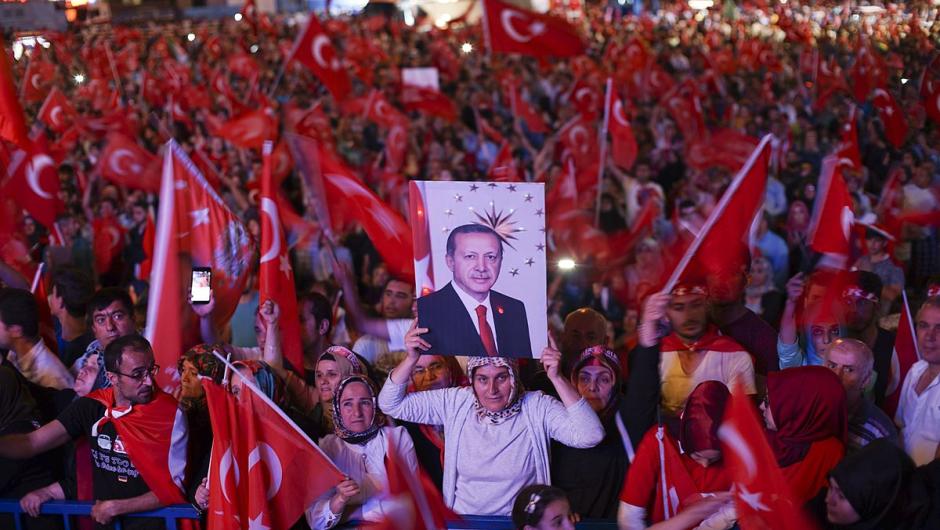Not a Bit of Self-Doubt

Recep Tayyip Erdoğan reached his goal: with the approval of a narrow majority, Turkey implemented a system change from a parliamentary democracy to a presidential democracy “a la turca”. According to the Turkish President’s understanding of “majority democracy”, the vote of 16th April is – may it also happened under dubious circumstances – the starting point for the construction of a “New Turkey”, which clearly differentiates from the previous “West Orientation”.
Although the public election commission did not officially confirm the result yet, despite the justified objections of the opposition circles, the success of the “Yes”-campaign can be seen as sealed. 51.4% of the eligible voters decided in favour of a fundamental reorganisation of the presidential system. In the future, the strings of power of the “New Turkey” will be pulled in this system.
It was often doubted if the voters were aware of the scope of their decision. However, one thing is clear. Those, who voted with “yes”, placed their (almost blind) trust in the strength and assertiveness of the political leader Erdoğan and the party in government, AKP, which is exclusively shaped by him. Rather surprising is the eventually high proportion of “No”-votes (48.6%), especially in metropolitan cities and along the (prospering) Western and Southern coasts of the country. This vote was certainly directed against the person of “Reis”, the power seeker Erdoğan, and against his indented turning away from the fundaments of democracy. The Turkish democracy, which developed in the previous years, with strengths and with many weaknesses, constantly shaped by the radical modernisation will of Mustafa Kemal Atatürk.
A Deeply Polarised Country
Actually, there was no need for a renewed evidence of the deep political, but also social split of Turkey. For everyone, who still did not want to believe it, the 16th of April delivered a clear proof. The country is splitting into two huge groups. On the one side the Islamic-conservative, traditional part of the population, mainly domiciled in the central, less developed provinces of Anatolia and along the Back-Sea Coast. These, often only sufficiently educated voters, expect nothing else than the continuation of the present policy of economic and social rise, the consideration of interests of the rural population and an Islamic-conservative prevailing mood, which fights back the westernisation of the country with the strong gesture of the newly acquired self-esteem. They follow the “Reis” without fuss or quibble.
On the other side, there is a much more heterogenic bloc, made up of supporters of a fundamental democratization and a pro-European stance, but partly also by extreme Turkish nationalists, who always mistrusted the “Islamist” Erdoğan. Without the latter, mostly voters of the right-wing nationalist party MHP, such a narrow result would not have been reached in the April referendum. With the knowledge of the heterogeneity of the “No”-side, the great leader will not be lead astray concerning the realisation of his political line. Everybody who – after the failure of the Gezi-Park-Movement – sees in the result a further “fountain of youth”, unfortunately cherish an illusion. Those, who always warned to dispose Turkey as “Erdoğanistan” on the trash heap of the European Integration history, can feel vindicated. Too small is the majority of the EU-enemies and too large the amount of people who still want to see an orientation of their home country towards Europe and its values.
The “New Turkey”
With the referendum, the hardliner of AKP showed us in which direction the journey of the “New Turkey” is going. Even if singe forces within the party and especially the economy will try to act moderating, the Islamic-nationalistic hotspurs in the “system media” and in the consultancy circle of the President will feel empowered with their anti-Western policy. Nothing else than a supposed necessary emancipation of Turkey from the imperialistic forces of the (Christian) West is proclaimed. These forces begrudge Turkey’s new economic power and the dominant position in the region and want to force it back towards the old dependence and spiritual-civilizational usurpation. The “West” is passé, the old kemalist Turkey is passé – although nobody knows (or dares to say) where the journey will end. “The Islamic World Community” or the “Shanghai Cooperation Organisation” (under the leadership of Russia or China) or simply an alliance of all enemies of the “imperial West” might appear on the horizon.
The Next Steps: Further Confrontation
Certainly, it can be expected that the final result will not deflect the President from his course. He was already aware before the election that he is only representing a weak majority of the population. Because he does not like the idea of a pluralistic democracy which integrates legitimate minority interests as well, his ego will not be damaged by self-doubts. “Offensive” is his parole – the next chapter is the reintroduction of the death penalty. Erdoğan has it on his political agenda. Thereby he will give his enemies in the ranks of EU the next lesson. Their warnings will not have any effect as long as the “Reis” is very sure of his idea and of himself. It is always – as we can see – sufficient for a narrow but decisive majority. With this method, Erdoğan’s people have come very far. The near future will show if Turkey – regardless of structural weaknesses, power political realities and economic constraints – will fulfil its dream of new power and new self-esteem. A dream, that inebriates so many Turkish citizens – in and outside Turkey. A rude awaking cannot be ruled out.
Dr Hans-Georg Fleck is the Project Head of FNF Turkey.